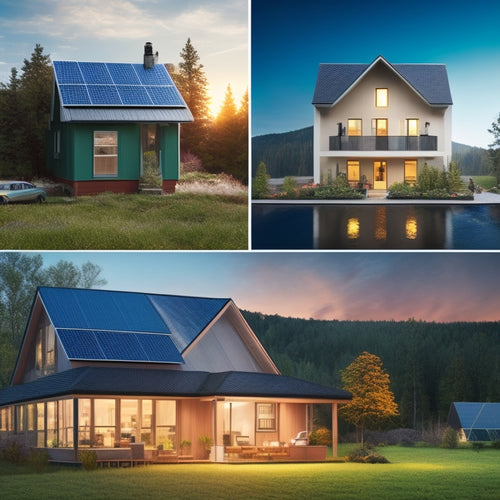
7 Geothermal Heating Benefits for Earth-Conscious Communities
Share
You're likely already aware that geothermal energy is a renewable resource, but did you know that it can provide a sustainable and reliable heating solution for your community, while also reducing your carbon footprint and saving you money on energy bills? By adopting geothermal heating, you'll not only reduce your reliance on finite fossil fuels, but also minimize environmental impact, lower operating costs, and enjoy reliable performance. Plus, you'll enhance your property value, take advantage of government incentives, and contribute to a cleaner, healthier planet. And that's just the beginning - investigate further to uncover the full range of benefits.
Key Takeaways
- Geothermal heating reduces reliance on finite fossil fuels, mitigating climate change and supporting a cleaner, healthier planet through sustainable practices.
- It minimizes environmental impact with negligible greenhouse gas emissions, contributing to a cleaner environment and better quality of life.
- Geothermal systems guarantee lower operating costs compared to traditional HVAC systems, allowing for significant savings on energy bills.
- They provide a steady heat supply throughout the year, ensuring predictable energy output for budgeting and planning.
- Geothermal heating boosts property value considerably, attracting eco-conscious homebuyers and investors, and serving as a unique selling point in the real estate market.
Renewable Energy Source Advantage
As you investigate the advantages of geothermal heating, one of the most significant benefits stands out: its status as a renewable energy source. This means that geothermal energy is sustainable and won't deplete natural resources.
You'll be reducing your reliance on finite fossil fuels, which contributes to climate change and environmental degradation. Geothermal exploration has minimal environmental impact, as it utilizes heat from the Earth's core rather than burning fuels. This results in negligible greenhouse gas emissions and a cleaner environment.
By choosing geothermal heating, you're supporting a cleaner, healthier planet, and that's a freedom worth fighting for. Additionally, geothermal energy can be used in conjunction with other renewable energy solutions, such as solar panels and wind turbines, to create a hybrid energy system that maximizes efficiency and minimizes emissions.
With geothermal energy, you can enjoy the freedom to live life sustainably, without compromising on comfort or convenience.
Lower Operating Costs Guaranteed
With respect to your energy expenditure, geothermal heating provides a significant advantage: it guarantees lower operating costs.
You'll save money on your energy bills, which means you'll have more freedom to allocate your resources as you see fit.
By embracing renewable energy sources, such as geothermal heating, you can reduce your taxable income and offset costs of conversion through government incentives.
Compared to traditional HVAC systems, geothermal heating requires less maintenance, resulting in lower maintenance requirements.
Although installation challenges may arise, the long-term benefits far outweigh the initial costs.
Geothermal heating systems are highly efficient, converting up to 4 units of energy from the earth for every unit of electricity used.
This means you'll enjoy significant savings on your energy bills, giving you more financial freedom to pursue your goals and values.
Reliable and Consistent Performance
You can count on geothermal heating systems to provide a steady heat supply, as they're designed to operate consistently throughout the year.
This reliability translates to predictable energy output, which means you'll always know what to expect from your system. With minimal downtime risk, you'll enjoy uninterrupted comfort and reduced maintenance worries.
Additionally, geothermal energy utilizes Earth's heat for sustainable power, reducing greenhouse gas emissions renewable energy sources.
As a result, geothermal heating systems can seamlessly integrate with other eco-friendly technologies, such as solar panels and wind turbines, to create an extensive sustainable energy solution.
Steady Heat Supply
Geothermal heating systems provide a steady heat supply because they tap into the Earth's natural heat, which remains relatively constant throughout the year. This means you can rely on a consistent flow of warmth, even during extreme weather conditions.
As a result, geothermal systems guarantee efficient heat distribution throughout your home, providing you with a comfortable living space. Since the Earth's heat is constant, you don't have to worry about sudden drops in temperature or inconsistent heating performance.
With geothermal heating, you'll enjoy a steady heat supply that's not affected by seasonal changes or weather fluctuations. Additionally, geothermal energy utilizes Earth's internal heat for reliable electricity generation renewable energy sources, making it an attractive alternative to fossil fuels.
This reliable performance allows you to have more control over your energy usage and costs, giving you the freedom to live life on your own terms.
Predictable Energy Output
Its consistent performance guarantees that your home's heating system delivers a predictable energy output, allowing you to plan your energy usage and budget with confidence.
With geothermal systems, you'll enjoy reliable and consistent performance, ensuring that your energy needs are met without interruptions. By leveraging fast charging infrastructure, you can further optimize your energy usage and reduce reliance on traditional power sources.
This predictability enables you to achieve energy independence, reducing your reliance on external energy sources. As a result, you'll experience fewer fluctuations in your energy bills, providing a sense of freedom from market volatility.
Minimal Downtime Risk
With a reliable energy supply in place, the next logical step is to guarantee that your heating system remains operational when you need it most. Geothermal heating systems are designed to provide minimal downtime risk, ensuring consistent performance even in extreme weather conditions.
| System Component | Reliability Feature |
|---|---|
| Heat pumps | Redundant compressors for backup |
| Piping | Insulated and protected from corrosion |
| Ground loops | Multiple loops for load balancing |
| Controls | Automated monitoring and alert systems |
Space-Saving Design Opportunities
You'll appreciate the flexibility of geothermal heating systems, which can be designed with compact layouts that minimize visual impact and free up precious space for other uses.
This allows you to optimize land use planning, making the most of your property's potential.
Compact System Layouts
A geothermal heating system's compact layout is a significant advantage, particularly in urban areas or buildings with limited space.
You can maximize system integration by strategically placing components, such as pumps and heat exchangers, in close proximity. This reduces the overall footprint of the system, making it ideal for areas where space is at a premium.
However, compact layouts can also present installation challenges. You'll need to carefully plan and execute the installation to guarantee that all components are properly connected and functioning efficiently.
With careful planning, a compact geothermal heating system can provide reliable, eco-friendly heat while minimizing its physical presence.
Efficient Land Use Planning
Geothermal heating systems' compact layouts also open up opportunities for efficient land use planning.
As you design your community, you can allocate more space for land preservation, parks, and green areas, promoting a healthier environment and better quality of life.
By minimizing the footprint of your heating system, you can free up land for community engagement initiatives, such as community gardens, public art spaces, or outdoor recreational facilities.
This space-saving approach enables you to create a more sustainable, eco-friendly community that prioritizes both environmental stewardship and community well-being.
Reduced Carbon Footprint Impact
One of the most important advantages of geothermal heating is its minimal impact on the environment, particularly regarding reducing carbon footprint.
By utilizing the natural heat of the earth, you greatly decrease your reliance on fossil fuels, which are major contributors to greenhouse gas emissions. This sustainable practice not only benefits the environment but also enhances community engagement.
As you adopt geothermal heating, you're contributing to a cleaner, healthier environment for your community. With a reduced carbon footprint, you're promoting a better quality of life for current and future generations.
Increased Property Value Potential
With a geothermal heating system installed, your property's worth is ready to increase considerably. This is because eco-conscious homebuyers and investors are driving current property market trends, seeking out sustainable and environmentally friendly features.
As a result, your real estate investment becomes more attractive and significant. A geothermal heating system is a unique selling point that sets your property apart from others on the market.
In addition, it provides a competitive edge, potentially leading to higher selling prices and increased returns on investment. By installing a geothermal heating system, you're not only reducing your carbon footprint but also making a smart financial move that can pay off in the long run.
Government Incentives Availability
You're likely to be surprised by the array of government incentives available to homeowners and businesses that invest in geothermal heating systems. The federal government offers tax credits of up to 26% of the total installation cost, allowing you to meaningfully reduce your tax liability.
Additionally, many states offer rebates and grants to further incentivize the adoption of geothermal energy. These incentives can greatly reduce the upfront cost of installing a geothermal system, making it a more accessible and affordable option for those looking to reduce their carbon footprint.
Frequently Asked Questions
Can Geothermal Systems Be Installed in Existing Buildings?
You can install geothermal systems in existing buildings, but you'll face installation challenges, such as limited space and outdated infrastructure. However, retrofit solutions, like modular designs and phased implementation, can overcome these obstacles, allowing you to utilize geothermal energy efficiently.
How Long Do Geothermal Heating Systems Typically Last?
You'll find that geothermal heating systems typically last 20-30 years, with some units lasting up to 50 years, making them a long-term investment that can offset high installation costs with long-term energy efficiency gains.
Are Geothermal Systems Suitable for Small or Large Communities?
You'll find geothermal systems suitable for communities of all sizes, as they can be scaled to meet specific energy demands, providing ideal energy efficiency regardless of whether you're in a small town or a large metropolitan area.
Can Geothermal Energy Be Used for Cooling as Well as Heating?
You'll find that geothermal energy can indeed be used for cooling, not just heating, through geothermal cooling systems that utilize the earth's natural temperature to provide energy-efficient cooling, reducing your reliance on traditional HVAC systems.
Do Geothermal Systems Require Frequent Maintenance Checks?
You'll find that geothermal systems require minimal maintenance checks, ensuring system efficiency and reducing the need for costly repairs, which is a bonus considering the initial installation costs that come with investing in this eco-friendly technology.
Related Posts
-

What Does Your Home Energy Audit Report Reveal?
Your home energy audit report reveals a detailed analysis of your energy consumption patterns, highlighting areas of ...
-

What Do Power Strips Do for Standby Energy?
You're likely aware that your devices, such as TVs and computers, continue to draw power even when turned off, a phen...
-

7 Smart Air Purification Hacks for Energy-Savvy Homes
You can notably improve your indoor air quality while minimizing energy consumption by implementing strategic air pur...


